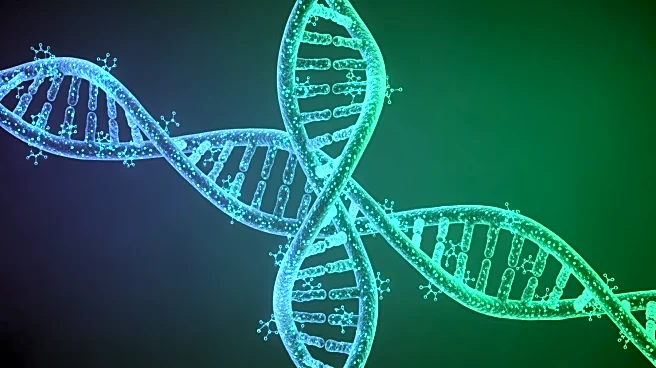What's Happening?
Cornell researchers have introduced a new DNA sequencing technology that allows for the study of transposons, which are mobile genetic elements within the genome. These transposons, once considered 'junk
DNA,' play significant roles in immune response, neurological function, and genetic evolution. The technology, known as CUT&Tag, overcomes limitations of previous sequencing methods, enabling detailed exploration of transposons. This discovery has implications for understanding disease development, treatment, and agricultural advancements. Transposons, which make up half of the human genome, are remnants of ancient viruses and can cause genetic mutations that may lead to diseases or offer protection against infections. The study, published in iScience, highlights the potential for transposons to impact clinical therapy, fertility treatment, and organismal development.
Why It's Important?
The development of this new DNA sequencing technology is crucial for advancing genetic research and medical treatments. By enabling a deeper understanding of transposons, researchers can explore their roles in disease mechanisms and potential therapeutic applications. This could lead to more targeted cancer therapies and improved fertility treatments. Additionally, the technology may provide insights into agricultural practices, enhancing crop resilience and productivity. The ability to study transposons more effectively opens up possibilities for addressing genetic disorders and improving human health outcomes. As transposons are integral to genome function, this research could lead to significant breakthroughs in various scientific fields.
What's Next?
The introduction of CUT&Tag technology is expected to usher in a 'golden age' of genetic research over the next five to ten years. Researchers anticipate that this technology will lead to a better understanding of transposon functions and their applications in clinical therapy and agriculture. Future studies may focus on leveraging transposons for disease prevention and treatment, as well as exploring their roles in evolutionary biology. The ongoing research could result in new strategies for combating genetic disorders and enhancing crop yields, ultimately benefiting both human health and food security.
Beyond the Headlines
The discovery of transposons' significance challenges the long-held notion of 'junk DNA' and highlights the complexity of the human genome. This research underscores the importance of revisiting established scientific concepts and exploring overlooked genetic elements. The ethical implications of manipulating transposons for therapeutic purposes may also arise, necessitating careful consideration of potential risks and benefits. As scientists continue to uncover the mysteries of the genome, this study exemplifies the transformative power of innovative technologies in advancing scientific knowledge.









